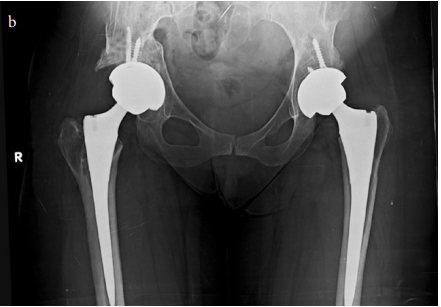Objective: This study aimed to evaluate whether a history of a pelvic osteotomy or proximal femoral osteotomy compromises the outcomes of total hip arthroplasty in patients with dysplastic coxarthrosis.
Methods: The results of total hip arthroplasty in 240 hips of 172 patients without previous pelvic osteotomy or proximal femoral osteotomy were compared to 118 hips of 88 patients with a previous pelvic osteotomy or proximal femoral osteotomy (osteotomy group). Technical difficulties and rates of complications during surgery, operative time, estimated blood loss, rates of postoperative complications, and pre- and postoperative Harris Hip Scores and visual analog scale pain scores were compared between the two groups.
Results: In the osteotomy, the rate of complications was higher and the operative time was longer. The estimated blood loss was also higher, and the latest follow-up Harris Hip Scores and visual analog scale pain scores were worse in this group. Total hip arthroplasty was more demanding and the revision rate was higher in the osteotomy group (six vs four revisions).
Conclusion: Our data showed that a previous history of pelvic osteotomy or proximal femoral osteotomy compromised the clinical outcomes of subsequent total hip arthroplasty and is related to an increased rate of complications, prolonged operative time, and increased amount of blood loss.
Level of Evidence: Level III, Therapeutic Study
Cite this article as: Erdogan F, Can A. The effect of previous pelvic or proximal femoral osteotomy on the outcomes of total hip arthroplasty in patients with dysplastic coxarthrosis. Acta Orthop Traumatol Turc 2020; 54(1): 74-82.



.png)
.png)

